#ClassicFilmReading: Doris Day: Her Own Story by A.E. Hotchner
I was so thoroughly engaged in this book it felt like I was listening to Doris tell me her life story.
This is my fourth book for this summer's Classic Film Reading Challenge. My reviews for June Allyson, Loretta Young, and Ginger Rogers are found here, here, and here.
As is the theme this summer, Doris Day's book is another as-told-to autobiography based on extensive interviews with the star herself, and written in her voice, with asides from her family, friends and co-stars, along with a prologue and epilogue from A.E. Hotchner. (A note about A.E. Hotchner: he was a prolific writer who helped craft biographies from Doris Day and Sophia Loren; and also co-founded Newman's Own with his buddy Paul Newman.)
The take-away? For as much as she was Doris Day—the perpetually cheerful, sunny, box office star with a golden voice and charmed life—she wasn't at the same time, and chafed at being 'typecast' as that role.
She hated being Doris Day so much that her closest friends didn't even call her that. Her birth name was Doris Kappelhoff (the stage name came from a song called 'Day After Day') but her friends called her everything from Do-Do (Gordon MacRae), Suze Creamcheese, Eunice (Rock Hudson; she called him Ernie), and the most famous Clara Bixby (christened by Billy De Wolfe).
I think what makes her Doris Day is how adaptable she was. She accepted life as it was tossed at her and molded it into something she wanted out of it. As a child, she was poised to be a big-time dancer until an accident with a train (yikes) broke her leg. Bedridden, she turned to music and song and leaned into vocal lessons. She became a singer on the local radio station, then began touring with the big bands.
(An aside here to note how Doris described all the big bands of the day: there was precision in Glenn Miller's Band. Sweet, swing style in Tommy Dorsey's Band. Benny Goodman's style was jump. Les Brown's style was staccato.)
And once she found herself in Hollywood, the wife of a musician, she stumbled into the movies (quite literally) with an audition for Romance on the High Seas in 1948, her breakthrough film, and one that helped make her a star.
For the next 20 years, Doris was one of Hollywood's biggest stars, going from strength to strength until she was a bonafide box office queen starring in hits like Pillow Talk and The Man Who Knew Too Much.
And even then, Doris stuck to her tried-and-true philosophy: "To thine own self be true. Don't imitate. Don't try to imagine how someone else might feel. Project your honest response to your movie situation, quite the same as you would respond honestly to a life situation. I have never been one for artifice. It is a characteristic I despise. I am always exactly what I am, I always show exactly how I feel. If I am happy, I bloom with it. If I am depressed or grouchy, everyone around me knows it."
In the prologue of this book, Doris and her son Terry Melcher are having lunch with Hotchner and she says that she's not the Doris Day everyone knows her as; there's a rich inner life there, and values that seem to clash with the long-held notion that she was pure and virginal. She goes out of her way a few times to mention that infamous Oscar Levant quip, "I knew Doris Day before she was a virgin," to seemingly prove it false.
Doris's attitude towards love and sex seems strikingly modern compared to her on-screen persona. She believed in sex before marriage (and believe me, loved to talk about the sex she'd been having) and living with a potential husband before marriage as well. She held modern views regarding race and feminism but disliked vulgarity (she turned down the role of Mrs. Robinson in The Graduate and disliked swearing, to the point that she'd keep a swear jar near her and require people to fill it when their tongues slipped).
She was a staunch animal rights activist long before it was a fashionable cause (a fun anecdote from Hotchner at the end of the book is that she was organizing a celebrity auction to benefit the cause and snagged a pair of pajamas from Paul Newman's wardrobe in The Sting. When Hotchner called to tell him that, Paul was like, Well that's great I'm glad they made so much money off them but I didn't wear pajamas in that movie..."
More than just a thorough story of her career, this truly captures the full life story of Doris Day. It goes into her early years and paints a vivid portrait of her life in Cincinnati; her failed marriages and how she adapted her life around them (her first husband was cruel and abusive and she barely escaped with her life; her second husband would've been Mr. Doris Day if he'd stuck around but he didn't want to see it happen); her Christian Science beliefs (the biggest take-away for me was that she was still willing to use medicine when needed, but Marty Melcher, her third husband, was jealous and insecure and tried to lord it over her head that he was a better Christian Scientist than her, and her whole vibe seemed to be "...mkay?"); and her legal troubles.
One of the biggest stories of Doris's life is that by the end of her career, her husband/manager Marty Melcher had her wrapped up in a terrible deal with Jerry Rosenthal and she lost her money. She took him to court in the '70s and won. And Marty...he seemed to be jealous of his wife's success and pushed her into movies she didn't want to make towards the end of her career (basically everything after Move Over, Darling, with the exception of With Six You Get Eggroll) and signed her up for a television series without consulting her. He died in 1968 and left Doris and Terry the spectacular job of untangling everything he'd messed up.
But through it all, Doris never loses the charm in this book. It's very...Que Sera, Sera (a song, it must be stated, she didn't like at first because it sounded like a kiddie song).
Here's Doris talking about her signature song and life philosophy: "I strongly believe in the inevitability of everyone's life pattern. Our destinies are born with us. They are predestined to happen and the best one can do is to ride out the storms and bask in the glories. I don't believe in luck, good or bad. There is no such thin. I would hate to think that my life was a life of chance. There are those who believe that their careers happened because they had the good fortune of being at the right place at the right time. Nonsense. It was meant to happen. Of course, there has to be a beginning but I don't for one minute believe that luck has anything to do with it. The 'lucky' one was meant to be there, that's all..."
The take away, for me, is that Doris Day both was and wasn't. Whether life or luck got her there, she made the most of the experience and we're all the richer for it.
And, of course, here's some of the Hollywood gossip:
- When playing 'movie stars' as a kid with her cousin, Doris always played as Ginger Rogers.
- Didn't realize how movies 'work' and thought that Romance on the High Seas would be filmed aboard a cruise ship.
- Dated Jack Carson around the time they made Romance on the High Seas but their romance fizzled out.
- Thought Ginger Rogers was very self-assured (had no issues making her feelings known on the set of Storm Warning and got changes she wanted made).
- Enjoyed working with Clark Gable (Teacher's Pet) and James Cagney (Love Me or Leave Me) and was delighted that neither seemed to buy into their own mythology and were down to earth.
- Turned down the role of Mrs. Robinson in The Graduate because she couldn't see herself "rolling around in the sheets with a young man half my age whom I'd seduced."
- Kept thinking she was miscast in The Man Who Knew Too Much, to the point that she kept insisting that Hitch call up Grace Kelly and put her in the movie. "I really don't know what I was so set on getting employment for Grace that summer."
- Just about everyone interviewed for this book: her mother, her son, her friends and co-stars hated Marty Melcher (her third husband). By the end, she doesn't have many nice things to say about him either.
- Called Young Man With a Horn one of the "utterly joyless experiences" of her movie career and blamed it in part on Kirk Douglas who "never makes much of an effort toward anyone else. He's pretty much wrapped up in himself."
- Kirk Douglas was the only person interviewed who basically trashed Doris. He admits that for a time, the two used to socialize a lot with their spouses but then stopped and that he thinks Doris Day's persona is a mask. "Doris is just about the remotest person I know."
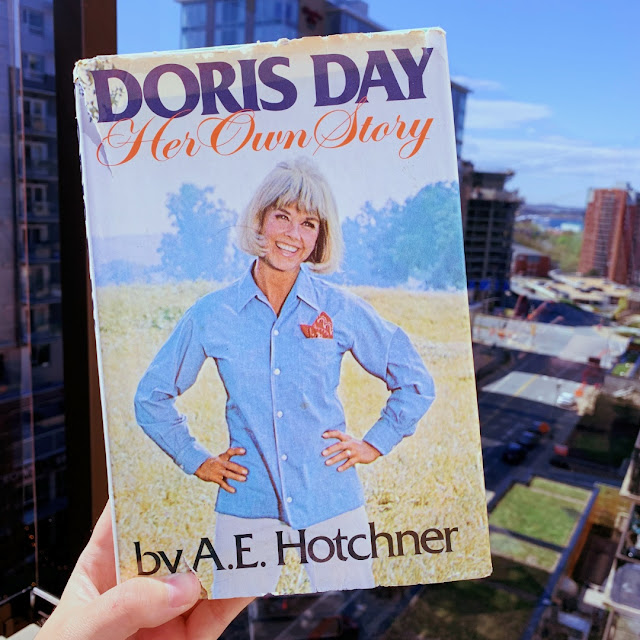
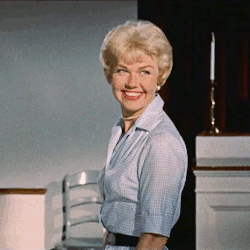
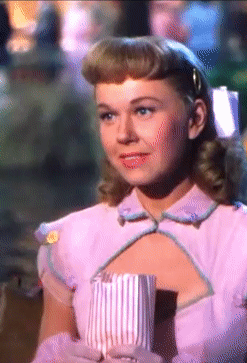
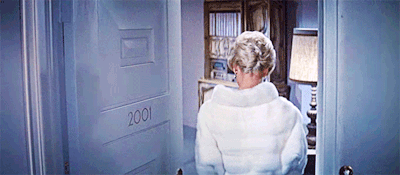
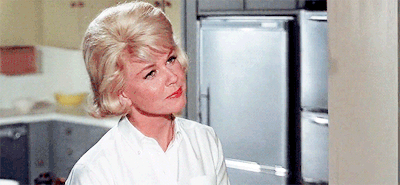
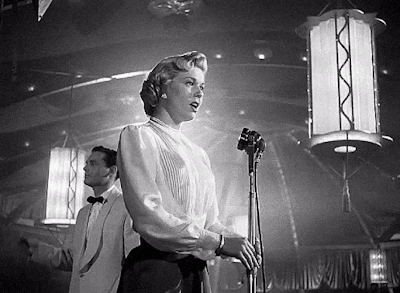
Doris Day's story is so fascinating! Especially her strong sense of self and how she kept the image of Doris Day separate from her own identity. And I'm here for the tea on the behind-the-scenes of Young Man with a Horn. wow!
ReplyDelete